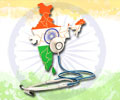CGHS Cards
Definition of Family
In accordance with the initial instructions issued under the CGHS Act, the term “Family” shall consist of the Government servant's wife or husband, as the case may be, children and stepchildren and the government employee’s parents who are the dependents and residing with the Government servant concerned. Based on the recommendations made by the Sixth Central Pay Commission, aged parents, sisters, widowed sisters, widowed daughters, minor brothers and children will be deemed dependent on the Government employee, if they are residing with him or her as well as their income from all sources including pension and pension equivalent of DCRG benefit is less than Rs. 3500 + DA (Daily Allowance) per month, are entitled for availing medical facilities under the healthcare scheme.
Entitlement of the Scheme
All Central Govt. Servants paid from Civil Estimates (other than those employed in Railway Services and those employed under Delhi Administration except members of Delhi Police Force) and dependant family members residing in cities where the Healthcare Scheme is functional, are entitled for the medical facility benefits, under this CGHS Scheme.
Transfer of Government Officials
In case a Central Government Employee is transferred to a city leaving behind his/her family which remains uncovered from the ambit of CGHS Act, such a Government Employee is not entitled for the medical benefits either for himself/herself or for his/her dependant family members under the CGHS Act, but instead will be governed under CS(MA) Rules and Regulations. In the event of posting or transfer of a Central Government Employee to North-Eastern States, Andaman and Nicobar Islands & Lakshadweep and such an employee’s family members continue to stay in a city or area covered by the healthcare scheme, CGHS benefits can be availed by issuance of temporary family permit to the family members by depositing usual contribution in advance. Under such circumstances, the Central Government Employee himself/herself will be governed under CS(MA) Rule.
Temporary visit to a CGHS-covered City
Central Government Employees and their dependent family members who are beneficiaries of the CGHS, are touring or visiting other cities across India where the scheme is operational and reside in areas covered under this CGHS Act, are entitled for free medical attendance, consultations or treatment under the said scheme. [Necessary permission for authorizing medical treatment as well as issuance of temporary cards in any of the cities covered under CGHS Act, should be issued by the respective department HODs (Head of Departments) in case of serving employees.] Medical treatment and healthcare facilities should be restricted to period not exceeding six months. In case, if the medical treatment exceeds the duration of six months, fresh sanction of authorities may be issued, if the same is deemed necessary based on the merits of the case. Similar facilities are also made available to pensioners and their dependent family members if they are holding or possessing CGHS Cards. In case of pensioners, prerequisite permission shall be granted by CGHS of the city that they are visiting or touring.
Production of CGHS Card
For deriving benefits and making usage of medical and healthcare facilities by the Government Servants, the production of CGHS Card is obligatory on every visit to a dispensary or a hospital. This is essential to enable correct identification of the patient as well as to prevent misuse of the card. The misuse of such a card is a cognizable offence under the Indian Law. However, keeping in mind humanitarian service being provided under CGHS Act, essential and immediate treatment should not be denied to the concerned individual but at the same time, the beneficiary should be advised to produce CGHS Card at the time of subsequent hospital visits. If deemed necessary, a note may be made in OPD slip of the patient.
The production of CGHS Index Card in the concerned dispensary will enroll the card-holder as a member of that dispensary or hospital. The renewal of Pensioners' card shall be done in the dispensary. For this purpose, the Indian Postal Order should be sent to Pensioner Cell, Nirman Bhavan, Delhi, regularly on or before 6th day of the following month. Before accepting the I.P.O.s (Indian Postal Order), the Chief Medical Officer In-charge of that particular hospital or dispensary must check and verify the date of issue of IPO/DDS which should be within one month of issue from the Post Office. The CMO (Chief Medical Officer) In-charge will obtain a certificate from each pensioner after everytwo years for calculation of rate of pension or the facts may he verified from his pension payment order before revalidation of CGHS card. The Chief Medical Officer (CMO) In-charge may therefore re-fix the rate of contribution pertaining to pensioners accordingly. In case of Pensioner, the transfer of card from one dispensary to another shall be made possible by the Chief Medical Officer (CMO) In-charge of that dispensary.
Registration of CGHS Card in Dispensary
Card Holder must deposit the Index Card in the dispensary and obtain receipt from the receiving clerk. The receiving clerk subsequently will issue the token card in confirmation of the same. Until the concerned Government employee deposits the Index Card, he/she is not entitled for treatment in the said dispensary or Hospital. On transfer to another dispensary/hospital, the Card Holder must collect the index card from that dispensarv and deposit the same along with necessary forms (in duplicate) to the new dispensary which has been allotted to him/her. Only after the deposition of Index Card in that particular dispensary, the members mentioned in the token card are entitled to obtain the benefits under CGHS facilities.
Surrender of CGHS Card
The Identity Card held by the beneficiary of the CGHS healthcare facilities other than Pensioner, General Public, Ex-MPs (Member of Parliament) etc. must be surrendered to the issuing authority in the following events viz.:
- Retirement /Resignation of the concerned government employee
- Death/Demise of Government Servant
- Transfer of Government Servant to another office. Incase if the Government Servant is transferred to another office where he/she is again entitled for CGHS benefits, must re-apply and obtain a new Identity Card.
In tune with the norms of the CGHS Act, Pensioners, ex-M.Ps (Member of Parliament), Member of General Public etc. are also required to surrender their CGHS Identity Cards to the concerned issuing authority on its expiry, in case if such individuals no longer desire to avail CGHS facilities.
Misuse of CGHS Card
If the Medical Officer detects a case of misuse of CGHS Token Card by an unauthorized person, he/she will bring to the notice of concerned Chief Medical Officer (CMO) In-charge and subsequently such a matter is reported to the Zonal Headquarters for initiating further action, as deemed necessary by the higher authorities.
Loss of Identity Card
When the CGHS card gets lost or is misplaced, it is likely to be misused. To prevent CGHS card from being misused, the concerned card holder must inform immediately to the Police and inform the following authorities accompanied with a copy of F.I.R. (Firsthand Information Report)
- Issuing authority
- M.O. In-charge of the concerned dispensary or hospital
- Headquarters of CGHS in the cities other than Delhi.
A duplicate card can be issued after realizing penalty of Rs. 5/- for 1st instance. On second instance, Rs. 7/-, 3rd and subsequent instances thereafter Rs. 10/-. In case of individual Plastic Cards in Delhi – the procedure is same but, the penalty is Rs.50/- per head.




![An Introduction - Indian General [Non-Life] Insurance Companies An Introduction - Indian General [Non-Life] Insurance Companies](https://www.medindia.net/images/patientinfo/120x100/health-insurance21.jpg)

















